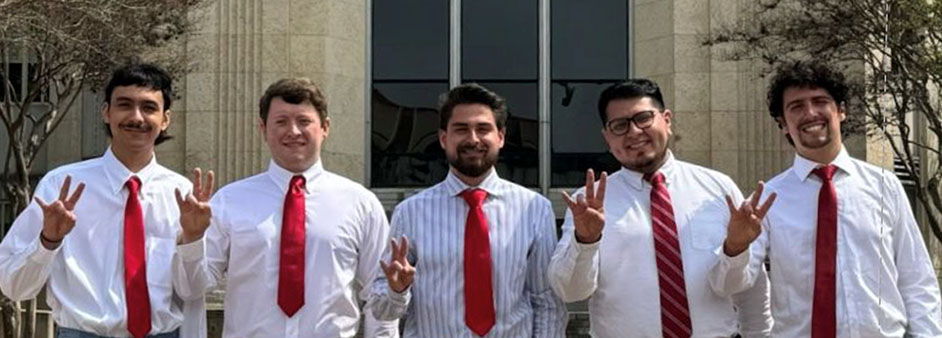UH Team Advances to Imperial Barrel Award World Finals
Team Analyzed Dataset of Bristol Basin along the Southern Margin of Alaska
A team of five Ph.D. and M.S. graduate students from the University of Houston’s Department of Earth and Atmospheric Sciences won first place in the Imperial Barrel Award Program (IBA) of the American Association of Petroleum Geologists (AAPG) Gulf Coast Section competition. Nine teams competed in the North America semi-finals.

Team members are Michael Daniel (Ph.D., Team Captain), Daniel Maya (Ph.D.), Gabriel Lopez (M.S.), Edgar Moreno (M.S.). and Josh Miller (M.S.). They competed online on March 18. Faculty advisors are Paul Mann and John Castagna, and industry advisors include Gary Guthrie (retired from Marathon) and Steve Walkinshaw (Vision Exploration).
The UH team will advance to the final, global competition to be held online May 31. The global competition includes all first-place teams from the sectional competitions.
The other teams involved in the 2024 North America semi-final competition included: Auburn University, Stephen F. Austin State University, Texas A&M University, University of Louisiana-Lafayette, University of Georgia, Hope College, Grand Valley State University, and the University of Bucharest (Rumania). The second-place award went to Texas A&M University, and the third-place award went to University of Louisiana, Lafayette.
In this annual competition, university teams analyze a dataset (geology, geophysics, land, production infrastructure, and other relevant materials) in the eight weeks prior to their local competition. Each team delivers their results in a 25-minute presentation to a panel of industry experts.
The dataset the 2024 UH EAS team presented was the Bristol Basin along the southern margin of Alaska. Students have the chance to use state-of-the-art computer technology and software on a real dataset, receive feedback from an industry panel of judges, and win cash awards for their school. The judges select the winning team based on the technical quality, clarity, and originality of the presentation.
The five volunteer oil industry judges were Mike Durcanin (Murphy Oil Corporation), Richard van den Brand (Total Energies), Senthil Yuvaraj (Oxy), John Klein (petroleum geology consultant), and Dave Miner (petroleum geology consultant).
In the finals, the UH team will represent the U.S. region and compete against eight other teams. These teams include University of Lagos (Africa Region), Institut Teknologi Bandung (Asia-Pacific), University of Alberta (Canada), Eotvos Lorand University and UniLaSalle Institut Polytechnique (West and East Europe), Universidad Central de Venezuela (Latin America and Caribbean), and Sultan Qaboos University and King Fahd University of Petroleum and Minerals (Middle East).
The IBA Program is rigorous and contributes to AAPG’s mission of promoting petroleum geoscience training and advancing the careers of geoscience students. The program currently involves 58 teams and 295 participants. Teams are given three options for data sets to analyze: petroleum exploration, carbon capture, and geothermal energy.
When the IBA Program began in 2007, UH was one of the first schools to become involved in the new program and won the Gulf Coast Section that year. At that time, only a few schools were involved. Before 2012, this was the last time UH placed in the competition. UH won the world competition in 2017 and 2019.
History of IBA at EAS Dept (2012–present)
- 2012 - Gulf Coast Third Place Finish (Nova Scotian margin)
- 2013 - Gulf Coast Third Place Finish (Merrimelia Ridge)
- 2014 - Gulf Coast Third Place Finish (Dutch North Sea)
- 2015 - Did Not Place (Cooper Basin, Australia)
- 2016 - Gulf Coast Second Place Finish (Viking Graben, Norway)
- 2017 - Gulf Coast First Place Finish (Taranaki Basin, New Zealand)
- 2017 - Global First Place Finish (Taranaki Basin, New Zealand)
- 2018 - Did not place (Otway Basin, Australia)
- 2019 - Gulf Coast First Place Finish (Northwest Australia)
- 2019 - Global First Place Finish (Northwest Australia)
- 2020 - Gulf Coast Second Place Finish (Northern Spain)
- 2021 - Gulf Coast First Place Finish (Faroe-Shetland Basin, United Kingdom)
- 2022 - Did Not Place (Northwestern Gulf of Mexico)
- 2023 - Did Not Participate in the Competition
- 2024 - North America Region Semi-Final First Place Finish (Bristol Bay, Alaska)
